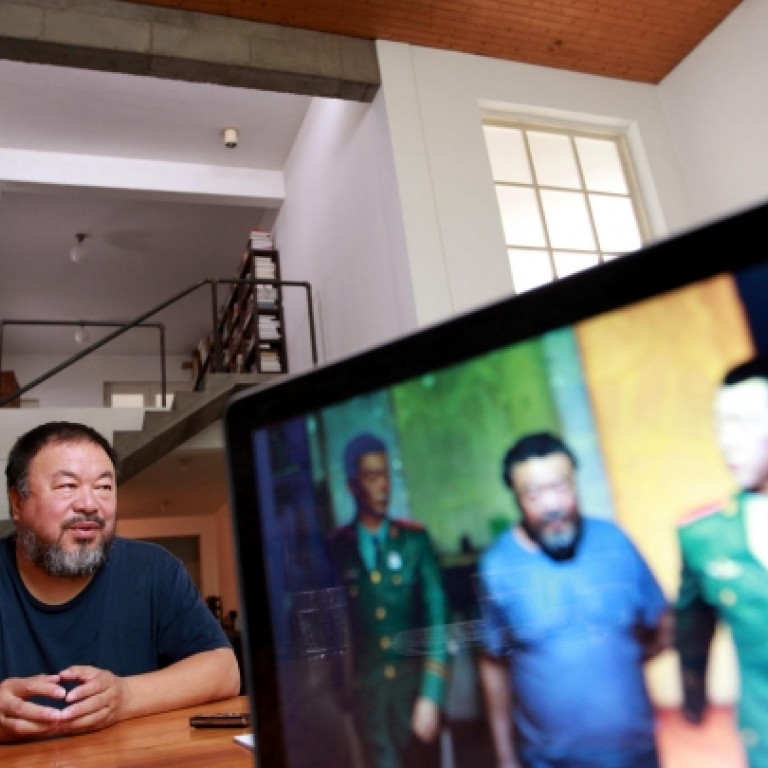
Video: artist Ai Weiwei gets candid in new heavy metal album
Known more for his visual art, the staunch government critic releases heavy metal album that expresses his anger at his recent treatment
Ai Weiwei has long been known for his unrelenting criticism of the government through works ranging from sculptures to art installations. Now, he is bringing this candid approach to his newfound passion for singing.
Ai, 55, yesterday released his first heavy-metal album in Beijing, featuring six tracks with lyrics and vocals by him. The release date coincided with the second anniversary of his release from detention after 81 days.
Video: Ai Weiwei tells the Post how the song Chaoyang Park came to be.
"The songs are based on my real experience and observations of what's happening around me," he said in his studio in the northern outskirts of Beijing.
The album's title, , is reference to both "Ai God" - a nickname sometimes used by his admirers - and Dante Alighieri's classic 14th-century poem about an allegorical journey through heaven and hell.
Among the six songs in the album is , named after a Sichuan delicacy, "pig's trotters with beans in broth". The accompanying music video features footage from his trip to the southwestern province in 2010 to attend the trial of a local activist.
The song is about Ai's encounters with the local police during the trip, when he was punched in the head by policemen who broke into his hotel room in the middle of the night.
A few weeks after the incident, while installing a show in Munich, he was taken to hospital for an operation to drain a pool of blood from the right side of his brain. In the song, Ai repeatedly asks: "Why did you beat me?"
"I am not here to make a fuss about my head injuries," he said. "I just feel I need to ask the question for all those out there who have been silenced in the past."
The music video ends with his extended middle finger in the foreground and a police banner in the background.
"Asking questions is not a challenge to the authorities, but a starting point for communication, which is conducive to building good social order," he said, denying that he is as brave as in the eyes of many Chinese. "I'm just a stubborn fellow who believes in principles of justice."
Video: A sequence in Ai Weiwei's garden.
Another song, , is inspired by a confrontation Ai had with a policeman who followed him around with a camera while he was taking a stroll in the park with his young son. Ai had lived under constant surveillance in the months after his release from his 81-day detention. But one day, he lost patience, grabbed the camera from the cop and removed its memory card.
When Ai returned home and inserted the memory card into his computer, he said he was shocked to see so many images from his daily life.
Two more songs, and , are about Chen Guangcheng , a blind legal activist, and Wang Lijun , the former Chongqing police chief, both of whom sought refuge at US consulates last year.
is also a reference to the Great Firewall of China, the mocking nickname for Beijing's ever-expanding system of internet censors and controls.
Ai said the idea of singing actually came from the paramilitary soldiers who watched him day and night during his detention at a Beijing jail.
"The soldiers were more nervous than me," he said. "They had to stand stiff-still in uniforms and stare at me all the time without any idea about my case. One day, they told me that I could sing for them. So I made the request and they granted it."
But all Ai could sing was revolutionary songs, and the guards listened with eager ears.
Ai said he was placed under the most extreme restrictions during his detention.
"I had to ask their permission for even the slightest moment. I could not scratch my head without their approval. Then, after I did it, they would ask me to put down my hand immediately."
The album also includes , a single released a month ago. Music on the tracks is by Zuoxiao Zuzhou, a self-taught rock musician who has been rapidly gaining popularity on the mainland.
Ai acknowledged the album contained a lot of anger and had a dark and hellish feel. He promised his next album would show his softer side.
"My next album, which is in the last stage of post-production, will be about romantic love," he said. "They are beautiful songs and people will love them."
Video: Ai Weiwei's latest exhibit filmed by the Post's Simon Song.
